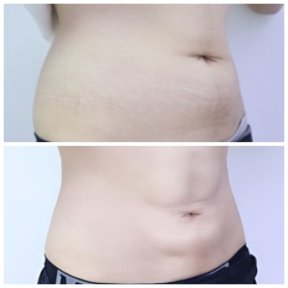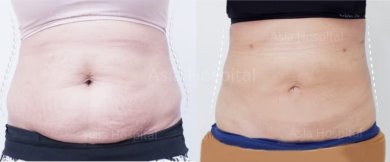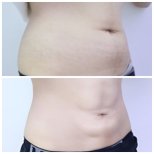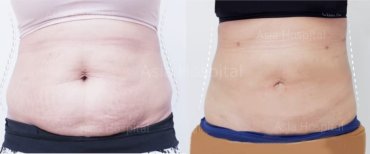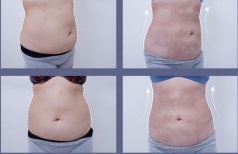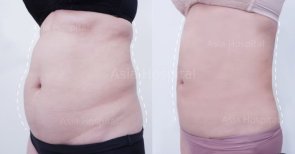Asia Cosmetic Hospital ұсынған бұл пакет дене контурын дәл қалыптастыру үшін заманауи Vaser және BodyTite әдістерін пайдалануды қамтиды. Доктор Джакрапонг Детсомбунрат 900-ден астам процедура жасаған. Барлық кезеңдер анестезиологтар мен кардиологтардың бақылауымен өтеді. Шамамен 1 920 $ құрайтын төлемге толық операция алдындағы тексеру, хирургиялық араласу, дәрі-дәрмектер және 6 айлық кейінгі кеңестер кіреді. Клиниканың JCI, ISO және Hospital Accreditation аккредитациялары әлемдік қауіпсіздік стандарттарын растайды және операциядан кейін асқынулардың болмауымен дәлелденген.
Бұл қалай жұмыс істейді
Таиландта іштің липосакциясының бағасы қанша? Қазір біліңіз
Таиландта іштің липосакциясы $2,100 / 71,400฿ мен $3,000 / 102,000฿ аралығында тұрады, Bookimed деректері бойынша. Орташа алғанда, процедура шамамен $2,600 / 88,400฿ болады. Баға май қабатының көлеміне, таңдалған әдіске (вакуумдық, лазерлік, ультрадыбыстық липосакция), хирургтың біліктілігіне және клиниканың деңгейіне байланысты.
Бағаға әдетте дәрігермен кеңес, операция алдындағы талдаулар (оның ішінде ЭКГ және рентген), жалпы анестезия, операцияның өзі, операциядан кейінгі күтім, дәрі-дәрмектер, клиникаға трансфер және кейінгі тексерулер кіреді. Пакетке қосымша процедуралар, компрессиялық іш киім немесе кеңейтілген бақылау кіретінін нақтылау қажет.
Артықшылықтар
- Тайландта абдоминопластиканы Германия немесе Польшаға қарағанда 30-40% арзан жасаңыз.
- Қолжетімді нұсқалар: дәстүрлі липосакция, лазерлік липосакция, ультрадыбыстық липосакция.
- Сіздің суреттеріңізді пластикалық хирургтың тегін бағалауы, липосакцияға арналған ең жақсы клиника мен әдісті таңдау үшін.
- Сіздің деректеріңіздің 100% құпиялылығы мен қорғанысы.
- Жоғары дәрежелі тай клиникаларынан эксклюзивті ұсыныстар.
| Таиланд | Түркия | АҚШ | |
| Іштің липосакциясы | бастап $3,035 / 103,190฿ | бастап $710 / 24,140฿ | бастап $5,000 / 170,000฿ |
Медициналық редактор
Фахад Мавлюд2026 жылы Ақпан айындағы Таиландта іштің липосакциясына бойынша эксклюзивті ұсыныстарды жіберіп алмаңыз
Таиландта ең жақсы Іштің липосакциясы клиникаларын ашыңыз: 18 тексерілген опциялар және бағалар
ID Clinic Bangkok
Dr Phatcharasak Kraisornphongsakul Md
Wansiri Hospital
Saran Wannachamras
Таиландта іштің липосакциясының: сапар жоспары
Күн 1: Таиландқа келу
- Егер сіз клиникаға 30% депозит сыртқы ақша аударған болсаңыз, әуежайдан тегін алып кету қызметін пайдаланыңыз.
- Қонақ үйге орналасып, сапардан кейін демалыңыз. Ыңғайлылық үшін клиникаға жақын орналасқан жерге тоқтаған дұрыс.
- Паспорт, ауру тарихы және клиника қағаздары сияқты қажетті құжаттарды дайындаңыз.
- Аспирин немесе қабынуға қарсы дәрілер қабылдамаңыз, себебі олар операция барысында қан кету қаупін арттыруы мүмкін.
- Егер сіз темекі шегетін болсаңыз, келгеннен кемінде 2 апта бұрын темекі шегуді тоқтатыңыз немесе азайтыңыз, себебі темекі тарту қалпына келуіне кедергі келтіруі мүмкін.
Күн 2: Операция алдындағы қабылдау
- Клиникадағы операция алдындағы қабылдауға барыңыз. Сізге қан талдауы, ЭКГ және рентген сияқты кешенді тексеру жүргізіледі.
- Жүргізілетін липосакция әдістерін талқылау үшін хирургпен кеңесіңіз. Әдістер Vaser липосакциясы, Bodytite липосакциясы және PAL (электротокпен липосакция) қамтуы мүмкін.
- Операцияның ерекшеліктерімен танысыңыз және растап, өңделетін облыстарды аяқтаңыз, мысалы, іштің жоғарғы және төменгі бөлігі, сондай-ақ қажет болған жағдайда бел немесе кеуде сияқты қосымша облыстарды.
- Барлық қалған құжаттарды толтырыңыз және операция алдында толық төлем жасалғанына көз жеткізіңіз.
- Аштық бойынша нұсқаулар алыңыз. Жалпы ереже бойынша, операцияның алдыңғы түнінен бастап тамақ пен сусын ішуге тыйым салынады.
Күн 3: Операция күні
- Клиникаға кесте бойынша келіңіз. Ыңғайлы, кең киім киіңіз.
- Жалпы анестезия қолдану туралы обсудить үшін анестезиологпен кездесіңіз. Бұл процедура барысында сіздің жайлылығыңыз бен қауіпсіздігіңіз үшін қажет.
- Құзыретті хирургтар тобының озық техника және жабдықтар пайдаланып, іш липосакция процедурасынан өтіңіз.
- Операциядан кейін қалпына келу бөлмесіне ауыстырыласыз, онда медициналық персонал алғашқы анестезия жағдайынан шығуыңызды бақылайды.
- Жағдайыңыз тұрақталғаннан кейін, қосымша бақылау үшін стандартты стационарлық бөлмеге ауыстырады. Қадағалау үшін түнгі уақытта қалуыңыз күтіледі.
Күн 4: Операциядан кейінгі күтім және шығару
- Операциядан кейінгі күтім бойынша медициналық топтың нұсқауларын алыңыз, соның ішінде ауырсынуды басқару және қалпына келтіруді жеңілдету үшін тағайындалған дәрі-дәрмектерді.
- Жазылу процесін жеңілдету үшін серпімді бинттер аласыз, бірақ госпитальдың компресс жасайтын киімдер бермейтінін ескеріңіз.
- Қонақ үйге оралу үшін, әсіресе сырттан көмек қажет болғандықтан, дұрыс көлік дайындаңыз, себебі сізге ұйқысырау немесе жайсыздық сезінуі мүмкін.
- Демалу процесін жылдамдату үшін клиникадан берілген кез келген диеталық шектеулерді немесе ұсыныстарды сақтаңыз.
- Кез келген шұғыл операциядан кейінгі мәселе үшін клиниканың байланыс ақпаратын алыңыз.
Күндер 5-7: Қалпына келу кезеңі
- Мүмкіндігінше демалыңыз және көп қозғалыстан аулақ болыңыз. Асқынуларды болдырмау мақсатында қозғалғыштығыңызды және мұқтаж қимылдарыңызды клиниканың нұсқауларына сәйкес ұстаныңыз.
- Операция аймағын таза және құрғақ ұстаңыз. Клиника ұсынған кез келген арнайы жара күтімі нұсқауларын орындаңыз.
- Жоспарланған барлық кейінгі кездесулерге қатысып, прогресті қадағалаңыз және кез келген мәселе бойынша әрекет етіңіз.
- Темекі шегуден және алкогольден аулақ болуды жалғастырыңыз, себебі олар жазылу процесіне кедергі келтіруі мүмкін.
- Клиникамен ашық байланыста болып, қажет болған жағдайда VIP-мейірбикелер мен ағылшын тілін аударушылар қызметін пайдаланыңыз.
2-4 апталар: Қалпына келтіру және кейінгі бақылау
- Медициналық маманның нұсқауларына сәйкес, белсенділік деңгейін біртіндеп арттырыңыз. Денеңіздің сигналдарына назар аударыңыз.
- Операциядан кейін 6 ай бойы тегін берілетін кейінгі кеңесулерге қатысып, оңтайлы жазылуды қамтамасыз етуді және ағымдағы мәселелерді шешіуді қадағалаңыз.
- Операция орнын кез келген инфекция немесе асқыну белгілері үшін қадағалаңыз. Егер бірдеңе оғаш байқасаңыз, клиникаға келіңіз.
- Жазылу процесіне қолдау көрсету үшін ұсынған қолдаушы киімдер немесе бинттерді киюді жалғастырыңыз.
- Үйге қайту жоспарын дайындаңыз, сізге ыңғайлы жүру үшін қауіпсіз және қажетті көмекке келісіп алыңыз.
Күн 28: Үйге оралу
- Барлық қажетті кейінгі қабылдауларға қатысып, медициналық маманның жүруге рұқсат бергеніне көз жеткізіңіз.
- Үйге қайтқанда қосымша қолдау қажет болса, барлық операциядан кейінгі күтім бойынша нұсқаулар мен клиниканың байланыс ақпаратын жинаңыз.
- Қозғалыс және жайлылық шектеулерін есепке ала отырып, үйге ыңғайлы және стресссіз сапарыңызды ұйымдастырыңыз.
- Үйге оралғаннан кейін де толық және табысты қалпына келу үшін барлық операциядан кейінгі күтім нұсқауларын орындауды жалғастырыңыз.
Bookimed, медициналық туризм саласындағы жетекші жаһандық платформа, Таиландтағы іш липосакциясын іздеген клиенттерге көмек көрсетуге тырыса отырып, кез-келген жағдай үшін сараптамалық көмек пен сенімді медициналық шешімдер ұсынады. Зияткерлік автоматты рейтинг жүйесі дәлдікті қамтамасыз ету үшін жасанды интеллект қолданатын деректерді өңдеу маманының қолдауымен мұқият жүргізілетін клиникалардың ашық тізімдерін жасау үшін қолданылады. Платформа емделгеннен кейін нақты пациенттердің пікірлерін жариялап, шынайылығын қамтамасыз етеді. Bookimed сенімділікті қамтамасыз ету үшін клиникалардан жаңартулармен бірге кешенді медициналық шешімдер ұсынады. Таиландтағы іш липосакциясы туралы материалдар тәжірибелі медик авторларымен жасалып, сарапшылармен тексеріліп, Bookimed-тің редакциялық ережелеріне сәйкес келеді, бұл платформаның жоғары сапалы және түсінікті медициналық ақпарат беру ұмтылысын көрсетеді. Толық ақпарат алу немесе сұрақтар үшін бізбен Marketing@bookimed.com адресі арқылы байланысыңыз немесе біздің миссиямыз және біз туралы көбірек мұнда біліңіз.
Таиландта іштің липосакциясының медициналық бағалауын алыңыз: 22 тәжірибелі дәрігерлер кеңесіңіз
Барлық дәрігерлерDr Phatcharasak Kraisornphongsakul Md
Tanongsak Panyawirunroj
Доктор Танонгсак Панявирунрой Asia Cosmetic Hospital-да ішті липосакциялауды қоса алғанда, эстетикалық процедуралар бойынша 15 жылдан астам мамандандырылған тәжірибеге ие.
- Siriraj ауруханасында пластикалық хирургия бойынша оқытылған
- Бас-бет және эстетикалық хирургия бойынша халықаралық тағылымдамалар
- Көптеген сәтті денені контурлау процедураларын орындады
- Косметикалық тамашалыққа бағытталған ASIA клиникасының негізін қалаушы
Saran Wannachamras
Доктор Ванначамрас Вансири ауруханасында іш аймағына липосакция жасау саласына пластикалық хирургиядағы ондаған жылдық тәжірибесін, соның ішінде АҚШ-тағы мамандандырылған дайындығын жұмсайды.
- Пластикалық және реконструктивті хирургия саласында 40 жылдан астам тәжірибесі бар
- АҚШ-тың Шығыс Вирджиния медициналық мектебінде (EVIMS) пластикалық және реконструктивті хирургия бойынша білім алған
- Тайландтың пластикалық эстетикалық хирургтар қоғамының мүшесі
- Липосакциядан басқа көптеген косметикалық процедураларға маманданған
Thanakom Laisakul
Доктор Танаком Лайсакул — Asia Cosmetic Hospital клиникасында дене пішінін түзетуге маманданған, сертификатталған пластикалық хирург.
- Пластикалық және реконструктивті хирургия саласында 20 жылдан астам тәжірибесі бар
- Сүт безі хирургиясы, денені контурлау және бетті жасарту бойынша сарапшы
- Сингапурде, Кореяда, Австралияда және АҚШ-та халықаралық дайындықтан өткен
- Халықаралық Эстетикалық Пластикалық Хирургия Қоғамының (ISAPS) мүшесі
Bookimed науқастарының бейне тарихтары
Bookimed туралы пікірлер: науқастардың нақты тәжірибесімен танысыңыз
Барлық пікірлерІштің липосакциясы: Дейін және кейін фотолары
Барлығын қарауОсы контентпен бөлісу
Таиландта іштің липосакциясына бойынша ЖҚС
Тайланд ішкі липосакция процедурасы үшін жақсы орын ба?
Bookimed порталының мәліметтері бойынша, Таиланд іш қуысы липосакциясы үшін тамаша орын, өйткені мұнда қызмет көрсету деңгейі жоғары, кәсібилігі жоғары және бағалары қолжетімді.
- Bumrungrad International Hospital - Оңтүстік-Шығыс Азиядағы ең ірі жекеменшік орталықтардың бірі, жылына 1 миллионнан астам пациент қабылдайды, олардың 50%-ы 190-нан астам елден келген шетелдіктер.
- Bangkok Hospital Pattaya - Таиландтың шығыс жағалауындағы негізгі емдеу және диагностикалық орталық, Халықаралық Бірлескен Комиссияның (JCI) стандарттарына сәйкес жұмыс істейді.
- Sikarin Hospital - халықаралық пациенттерге бағдарланған және пластикалық хирургия, ортопедия, гастроэнтерология және жүрек хирургиясы салаларында маманданған Таиландтағы жетекші медициналық орталық.
- B.Care Medical Center - кеуде түзетулері, ринопластика, іш тарту және бет көтеру үшін танымал орын.
- Siam Clinic Phuket - іш қуысы липосакциясын қоса алғанда, әртүрлі емдер көрсететін эстетикалық клиника.
Австралия, Жаңа Зеландия, Таяу Шығыс, Еуропа, Оңтүстік-Шығыс Азия және Америка Құрама Штаттарынан келген пациенттер Таиландқа медициналық емделуге келеді. Медициналық топ кәсіби, мұқият, мейірімді және қолдаушы.
Мысалы, Bumrungrad Hospital-де білікті және сыпайы қызметкерлер бар, бірақ кейбіреулері ағылшын тілін жақсы білмейді. Таиландтағы емдеудің құны қолжетімді, әсіресе Ұлыбританиямен салыстырғанда. Емдеудің сәттілік деңгейі жоғары, ал қызмет көрсету деңгейі астананың ең жақсы көрсеткіштерінің бірі болып табылады.
Тайландта абдоминалды липосакцияны жасау қанша уақытты алады?
Таиландта іш майын алу үшін қай аурухана ең жақсы?
Bookimed рейтингі Таиландтағы іштің липосакциясы бойынша үздік 5 аурухананы анықтады:
- B.Care Medical Center
- Siam Clinic Phuket
- Bumrungrad International Hospital
- Bangkok Hospital Pattaya
- Sikarin Hospital
Тайландтағы ең үздік абдоминалды липосакция дәрігерлері кімдер?
Bookimed Таиландтағы іш қуысының липосакциясын орындауда озат үздік дәрігерлерді анықтады:
- Анучит Китсомбат, Әсемдік медицинасы және косметология, пластикалық хирургия, 23 жыл тәжірибе
- Айчария Сарават, Әсемдік медицинасы және косметология, пластикалық хирургия
- Аккавич Харннавачок, Әсемдік медицинасы және косметология, пластикалық хирургия, 12 жыл тәжірибе
- Аморн Пумми, Әсемдік медицинасы және косметология, 5.0 шолу балы
- Сирипонг Прасертсунтарасай, Әсемдік медицинасы және косметология, 15 жыл тәжірибе
Тай медициналық мекемелерінде мен болуым барысында назар аударуым керек болатын мәдени айырмашылықтар немесе тәжірибелер бар ма?
Тай медициналық мекемелері қонақжайлылық пен жеке күтімді ерекше назарға алады, бұл Батыс тәжірибелерінен өзгеше болуы мүмкін. Қызметкерлер көбінесе үлкен құрмет пен ынта-жігер көрсетеді; тай мәдени дәстүрлерін тереңірек түсіну сіздің тәжірибеңізді жақсартуы мүмкін. Сонымен қатар, дәстүрлі саулық тәжірибелерін қазіргі заманғы медицинаға қоса отырып, кешенді тәсілге дайын болыңыз.
Тайландтан өз елімізге оралу кезінде операциядан кейінгі күтімді қалай жүргіземін?
Қайту сапарыңызды мұқият жоспарлаңыз, ұшу алдында бастапқы сауығу үшін жеткілікті уақыт қалдырыңыз. Ісіну мен қолайсыздықты азайту үшін саяхат кезінде компрессиялық киімдерді киіңіз. Әуежайларда көмек қажет болса, оны алдын ала ұйымдастырыңыз және бүкіл сапарыңызда тағайындалған дәрі-дәрмектерге қолжетімділігіңізді қамтамасыз етіңіз.
Егер ем шарасы шетелде, атап айтқанда Таиландта жасалса, менің медициналық сақтандыруым оның қандай да бір бөлігін жаба ма?
Көптеген денсаулық сақтандыру жоспарлары шетелде орындалатын ерікті косметикалық процедураларды қамтымайды. Дегенмен, кейбір халықаралық денсаулық сақтандыру полистері шетелде жасалған операциядан туындаған асқынуларға ішінара жабуды ұсынуы мүмкін. Шетелде операция жасатпа бұрын сақтандырушыңызбен кеңесу өте маңызды.
Таиландта іш липосакциясын жасауға байланысты операциясыз шығындарға не жатады, мысалы, жол және тұру шығындары?
Хирургиялық емес шығындарға маусымға байланысты өзгеретін ұшу құны; бюджеттік қонақ үйлерден бастап люкс тұруға дейінгі орналастыру; және тамақ пен көлік тасымалы сияқты күнделікті шығындар кіреді. Кешенді пакеттер көбінесе осы шығындардың кейбірін қамтиды, әуежайдан трансфер мен қонақ үйде тұруды қызметтің бір бөлігі ретінде ұсынады.
Мен Тайландтағы іш майын алу липосакциясын ұсынатын клиникалардың қауіпсіздік пен гигиена стандарттарын қалай тексере аламын?
Клиниканың JCI сияқты халықаралық ұйымдармен аккредитацияланғанын тексеріңіз, бұл ғаламдық қауіпсіздік стандарттарына сәйкестікті қамтамасыз етеді. Тазалық пен инфекциялық бақылау шаралары туралы науқастардың пікірлерін қарап шығыңыз. Алғашқы кеңес берулер кезінде стерилизация протоколдарына қатысты тікелей сұрақтар қою арқылы да сенімділікке ие бола аласыз.
Тайландта іш липосакциясынан кейін үйге оралғаннан кейін қандай қадағалау күтімі қажет?
Қайта қарау күтімі инфекция белгілеріне кесу жерлерін қадағалауды және ұсынылғандай компрессионды киімдер киюді қамтиды. Дұрыс жазылуын қамтамасыз ету үшін косметикалық хирургия туралы білетін жергілікті дәрігермен тексерулер жоспарлаңыз. Тай клиникаларының көбі халықаралық пациенттеріне оралғаннан кейін көмектесетін виртуалды қайта қарауларды ұсынады.
Таиландтағы медицина қызметкерлерімен сөйлескенде тілдік кедергілерге абай болу керек пе?
Көптеген тай медициналық мамандары, әсіресе халықаралық аккредитацияланған ауруханаларда, ағылшын тілін еркін меңгерген. Дегенмен, бастапқы кеңес беру кезінде тілде сөйлесу деңгейін растау ұсынылады. Кейбір клиникалар қарым-қатынасты жеңілдету үшін қажет болса, аударма қызметтерін ұсынады.
Ішті липосакциядан кейінгі қалыпты қалпына келтіру уақыты қандай және ол менің саяхат жоспарларымды қалай әсер етеді?
Операциядан кейін қалпына келу әдетте 3-5 күнге созылады, көптеген пациенттерге бірнеше апта бойы қарқынды қызметтен аулақ болуға кеңес беріледі. Алғашқы қалпына келтіру және бақылау консультацияларын өткізуге мүмкіндік беру үшін Таиландта кем дегенде 10-14 күн қалуды жоспарлаңыз. Осы кезеңде кез келген ықтимал медициналық қажеттіліктерді қамту үшін саяхат сақтандыруыңыздың бар екеніне көз жеткізіңіз.
Таиландқа іштің липосакциясын жасату үшін қалай дайындалуым керек?
Қажетті саяхат құжаттарын, мысалы, жарамды паспортты және мүмкін болатын визаны дайындаңыз. Операция алдындағы нұсқаулар туралы, оның ішінде қандай да бір диеталық шектеулер немесе бас тартуға тиіс дәрі-дәрмектер туралы хирургпен кеңесіңіз. Клиникаға жақын жерде тұруға тапсырыс беру және көлікті ұйымдастыру арқылы тұруыңызды жоспарлаңыз.
Таиландта ем-шара өту үшін клиниканы немесе аурухананы таңдағанда нені ескеруім керек?
Халықаралық ұйымдар, мысалы, JCI сияқты аккредитацияланған клиниканы таңдаңыз, жоғары қауіпсіздік пен гигиена стандарттарын қамтамасыз ету үшін. Алдын ала операциялық тексерулерді, операциядан кейінгі күтімді және орналастыруды қамтитын кешенді пакеттерді ұсынатын мекемелерді қарастырыңыз, бұл сіздің тәжірибеңізді жеңілдетеді. Сапаны бағалау үшін пациенттердің пікірлерін және сәттілік көрсеткіштерін зерттеңіз.
Таиландтағы хирургтың білікті және іш липосакциясын орындауда тәжірибелі екенін қалай кепілдендіре аламын?
Хирургтың беделді ұйымдармен, мысалы, ISAPS немесе Тай медициналық кеңесімен сертификатталғанын тексеріңіз. Пациенттердің пікірлері мен операция алдындағы және кейінгі фотоларымен расталған липосакцияда кең тәжірибесі бар хирургтарды іздеңіз. Олардың халықаралық деңгейде білім алуы немесе серіктестіктерінің болуы да пайдалы.
Тайландта іш липосакциясын жасау қандай ықтимал қатер мен асқынуларды тудыруы мүмкін?
Қарынға липосакция жасау инфекция, қан кету және кез келген хирургиялық процедураға ұқсас анестезияға кері реакциялар сияқты қауіп-қатерлерді тудырады. Арнайы асқынуларға контурдың бұзылыстары, сұйықтықтың жиналуы және ұйып қалу кіруі мүмкін. Сертификатталған хирургты және аккредиттелген мекемені таңдау осы қауіптерді азайтуға көмектеседі.
Таиландқа сапар алдында нені білу керек?
Ресми атауы | Тайланд Корольдігі |
Валюта | Тай баты (қызметтерге доллармен төлеуге де болады) |
Саяхатқа ең жақсы уақыт | Қараша - сәуірдің басы |
Тіл | Тай тілі (медициналық қызметкерлердің көпшілігі ағылшын тілінде еркін сөйлейді) |
Виза | 3-6 айлық сапар үшін қажет |
Еуропамен уақыт айырмашылығы | 7 сағат |
АҚШ-пен уақыт айырмашылығы | 12 сағат |
Астана | Бангкок |
Медициналық туризм орталығы | Бангкок |
Танымал курорттар | Ко Самуи, Пхукет, Чиангмай, Ко Чанг, Хуа Хин |
Тайландтағы медицинаның деңгейі қандай?
Денсаулық сақтау — Тай үкіметінің негізгі даму секторы. Тай билігі азаматтардың денсаулығына қамқорлық жасау мемлекет саясатының абсолютті басымдығы болуы тиіс деп сеніп, жыл сайын денсаулық сақтауға шамамен 25 миллиард бат жұмсайды.
Сондықтан, елде 36,673 медициналық мекеме керемет медициналық көмек ұсынады. Патшалықта 64 орталық JCI (Joint Commission International) халықаралық денсаулық сақтау сапасын және қауіпсіздігін жақсартушы сертификатқа ие. Сертификаттар саны бойынша индекс ең жоғарғы. Салыстыру үшін, Израильде 20 JCI аккредиттелген мекеме, ал Германияда — осы типтегі тек 10 клиника бар.
Мұнда қандай қонақ үй қызметі көрсетіледі?
Тайланд Патшалығында әртүрлі баға диапазонында және қызмет деңгейлерінде қонақүйлер ұсынылған. Тай қонақүйлерінің деңгейі Тунис, Марокко немесе Мысыр қонақүйлерімен салыстырмалы. Көптеген туристер бәрі кіреді тамақтануы бар 4 және 5 жұлдызды қонақүйлерді таңдайды. Мұндай қонақүйлерде жайлы демалу үшін бәрі бар: әртүрлі тағамдар, үлкен жақсы күтілген аумақ, балалар мен ересектерге арналған анимация. Кейбір қонақүйлерде қонақтар тегін пайдалана алатын жеке аквапарк бар. Бюджеттік саяхатшылар жартылай жүрекпен немесе мүлде тамақтанусыз экономикалық 3 жұлдызды қонақүйді брондауға мүмкіншілігі бар.
Таиландқа сапар жасау үшін ең қолайлы уақыт қашан?
Тай курорттарының басты артықшылығы - ұзақ жағажай маусымы. Шығыс жағалау мен батыс жағалаудағы климат ерекшеліктері әртүрлі, сондықтан сапарыңызды жоспарлағанда мұны ескеріңіз. Саяхаттауға ең жақсы уақыт - қараша мен сәуір айларының басы аралығындағы салқын және құрғақ маусым кезінде. Туристер ағынының ең көп уақыты наурыз-мамыр айларында, ауа температурасы +30°C болған кезде.
Маған виза керек пе?
Қазіргі уақытта Таиланд Королдігі әртүрлі мемлекеттер үшін әртүрлі виза режимдерін талап етеді. Кейбір шетелдіктер елде 60 күн визасыз бола алады, ал кейбіреулері — тек 14 күн.
Таиландта қанша уақыт болуға болатынын және қай елдер шекараны оңай кесіп өте алатынын мұнда оқыңыз.
Тайландқа ем алу үшін визаға өтініш беру үшін қандай құжаттар қажет?
Тайландқа саяхаттау үшін визаларға бірнеше құжаттар қажет. Қажетті құжаттарды жоспарланған кетер күннен 90 күн бұрын тапсыруға болады. құжаттар тізімі мыналарды қамтиды:
- Төлқұжат
- Онлайн тіркелуді растау және сауалнаманы толтыру
- Кіріс және қаражаттардың болуын растайтын анықтама (адам басына 20,000 бат/отбасыға 40,000 бат)
- Тайландта болуға арналған сақтандыру полисі (түпнұсқа және көшірме)
- 2 сурет (4x6)
- Виза түбіртегі
- Әуе билеттерінің және қонақ үйдің алдаманына төленгені туралы брондау
- Емделудің қажеттілігі туралы медициналық қорытынды.
